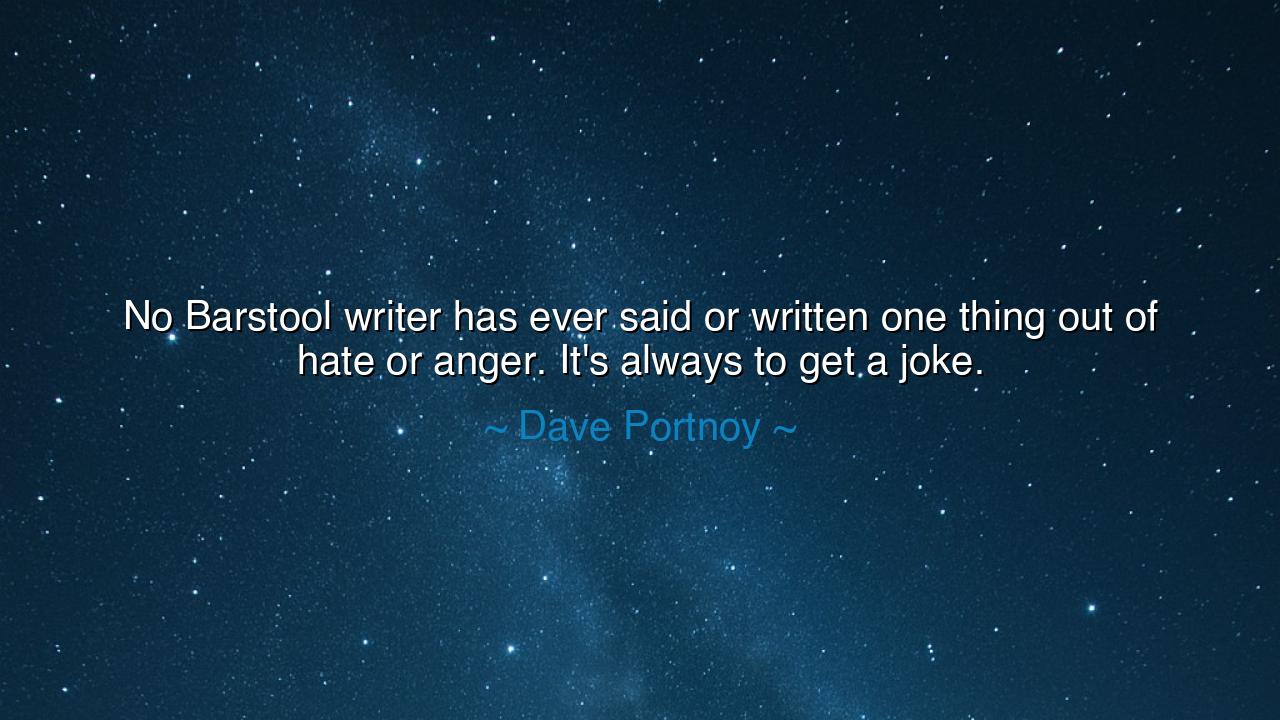
No Barstool writer has ever said or written one thing out of hate
No Barstool writer has ever said or written one thing out of hate or anger. It's always to get a joke.






Host: The mood in the room lightens as Jack and Jeeny reflect on Dave Portnoy’s words: "No Barstool writer has ever said or written one thing out of hate or anger. It's always to get a joke." Jack chuckles softly, clearly amused by the boldness of the statement, while Jeeny watches, sensing that there’s more to unpack in this defense of humor.
Jack: (laughing lightly, his voice amused) "Portnoy’s confidence in this statement is pretty funny. He’s saying that everything at Barstool is just about getting a laugh, not about hate or malice. It’s like he’s almost dismissing any criticism of their content as overblown, like ‘don’t take it too seriously, we’re just joking around.’"
Jeeny: (nodding, her voice thoughtful) "Yes, but at the same time, there’s an interesting tension in what he’s saying. Humor can absolutely be used to diffuse tension, but it can also be a way of masking or deflecting real issues. Portnoy is trying to present Barstool as a place where humor is the ultimate goal, but I think this can be dangerous, especially when jokes start to blur the line between humor and something more harmful. Is it always just about the joke, or does the context matter?"
Jack: (pausing, his voice reflective) "I think you’re right. There’s a fine line with humor, especially with the kind of content Barstool produces. It’s not just about getting a laugh; it’s about who you’re laughing at and why. What one person finds funny, another might find offensive, and sometimes, humor can be a way of hiding or excusing things that shouldn’t be dismissed so easily. Portnoy’s statement feels like a bit of an oversimplification."
Jeeny: (smiling softly) "Exactly. Humor has power—especially in the context of social media or public figures. It can either connect people or divide them. And when Portnoy says it’s all just to get a joke, he’s downplaying the impact those jokes can have. It’s not always about intent. Even if something isn’t meant with hate, it can still perpetuate harmful stereotypes or hurt someone. Humor doesn’t exist in a vacuum, it exists within a larger cultural context."
Host: The stillness in the room deepens, as Jack and Jeeny consider the role of humor in media and public discourse. Portnoy’s quote, while playful and confident, touches on a deeper conversation about the responsibility that comes with humor and its ability to influence. Jack looks out the window for a moment, contemplating the power of words, while Jeeny remains calm, her thoughts reflecting the complexity of humor in today's world.
Jack: (his voice softer, almost revelatory) "I think Portnoy’s statement works if you believe that humor can’t be taken too seriously. But the reality is, sometimes, the things we laugh about are tied to real-world issues. We might not always mean harm, but that doesn’t mean harm isn’t done. Humor has a role to play in shaping culture—it’s not just a throwaway thing."
Jeeny: (nodding, her voice insightful) "Exactly. Humor can either challenge us or reinforce old patterns. It’s easy to dismiss it as just ‘a joke,’ but the things we laugh at shape our perceptions of the world, and sometimes they reinforce things that should be questioned. Maybe the key is being more aware of what’s being joked about and why."
Host: The conversation feels fuller now, as both Jack and Jeeny reflect on the role of humor in our culture and the responsibility that comes with it. Portnoy’s words remind them of the fine line between laughter and insensitivity, and how humor, while meant to entertain, can also influence and shape perspectives in significant ways. The night outside has deepened, but the clarity of their thoughts continues to linger in the quiet room.






AAdministratorAdministrator
Welcome, honored guests. Please leave a comment, we will respond soon